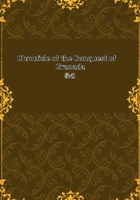
第3章
In the libraries of Madrid and in the private library of the American consul, Mr. Rich, I had access to various chronicles and other works, both printed and in manuscript, written at the time by eyewitnesses, and in some instances by persons who had actually mingled in the scenes recorded and gave descriptions of them from different points of view and with different details. These works were often diffuse and tedious, and occasionally discolored by the bigotry, superstition, and fierce intolerance of the age; but their pages were illumined at times with scenes of high emprise, of romantic generosity, and heroic valor, which flashed upon the reader with additional splendor from the surrounding darkness. I collated these various works, some of which have never appeared in print, drew from each facts relative to the different enterprises, arranged them in as clear and lucid order as I could command, and endeavored to give them somewhat of a graphic effect by connecting them with the manners and customs of the age in which they occurred. The rough draught being completed, I laid the manuscript aside and proceeded with the Life of Columbus. After this was finished and sent to the press I made a tour in Andalusia, visited the ruins of the Moorish towns, fortresses, and castles, and the wild mountain-passes and defiles which had been the scenes of the most remarkable events of the war, and passed some time in the ancient palace of the Alhambra, the once favorite abode of the Moorish monarchs. Everywhere I took notes, from the most advantageous points of view, of whatever could serve to give local verity and graphic effect to the scenes described. Having taken up my abode for a time at Seville, I then resumed my manuscript and rewrote it, benefited by my travelling notes and the fresh and vivid impressions of my recent tour. In constructing my chronicle I adopted the fiction of a Spanish monk as the chronicler. Fray Antonio Agapida was intended as a personification of the monkish zealots who hovered about the sovereigns in their campaigns, marring the chivalry of the camp by the bigotry of the cloister, and chronicling in rapturous strains every act of intolerance toward the Moors. In fact, scarce a sally of the pretended friar when he bursts forth in rapturous eulogy of some great stroke of selfish policy on the part of Ferdinand, or exults over some overwhelming disaster of the gallant and devoted Moslems, but is taken almost word for word from one or other of the orthodox chroniclers of Spain.
The ironical vein also was provoked by the mixture of kingcraft and priestcraft discernible throughout this great enterprise, and the mistaken zeal and self-delusion of many of its most gallant and generous champions. The romantic coloring seemed to belong to the nature of the subject, and was in harmony with what I had seen in my tour through the poetical and romantic regions in which the events had taken place. With all these deductions the work, in all its essential points, was faithful to historical fact and built upon substantial documents. It was a great satisfaction to me, therefore, after the doubts that had been expressed of the authenticity of my chronicle, to find it repeatedly and largely used by Don Miguel Lafuente Alcantara of Granada in his recent learned and elaborate history of his native city, he having had ample opportunity, in his varied and indefatigable researches, of judging how far it accorded with documentary authority.
I have still more satisfaction in citing the following testimonial of Mr. Prescott, whose researches for his admirable history of Ferdinand and Isabella took him over the same ground I had trodden. His testimonial is written in the liberal and courteous spirit characteristic of him, but with a degree of eulogium which would make me shrink from quoting it did I not feel the importance of his voucher for the substantial accuracy of my work:
"Mr. Irving's late publication, the 'Chronicle of the Conquest of Granada,' has superseded all further necessity for poetry and, unfortunately for me, for history. He has fully availed himself of all the picturesque and animating movement of this romantic era, and the reader who will take the trouble to compare his chronicle with the present more prosaic and literal narrative will see how little he has been seduced from historic accuracy by the poetical aspect of his subject. The fictitious and romantic dress of his work has enabled him to make it the medium of reflecting more vividly the floating opinions and chimerical fancies of the age, while he has illuminated the picture with the dramatic brilliancy of coloring denied to sober history."*
*Prescott's Ferdinand and Isabella, vol. ii. c. 15.
In the present edition I have endeavored to render the work more worthy of the generous encomium of Mr. Prescott. Though I still retain the fiction of the monkish author Agapida, I have brought my narrative more strictly within historical bounds, have corrected and enriched it in various parts with facts recently brought to light by the researches of Alcantara and others, and have sought to render it a faithful and characteristic picture of the romantic portion of history to which it relates.
W. I.
Sunnyside, 1850.
A CHRONICLE OF THE CONQUEST OF GRANADA.